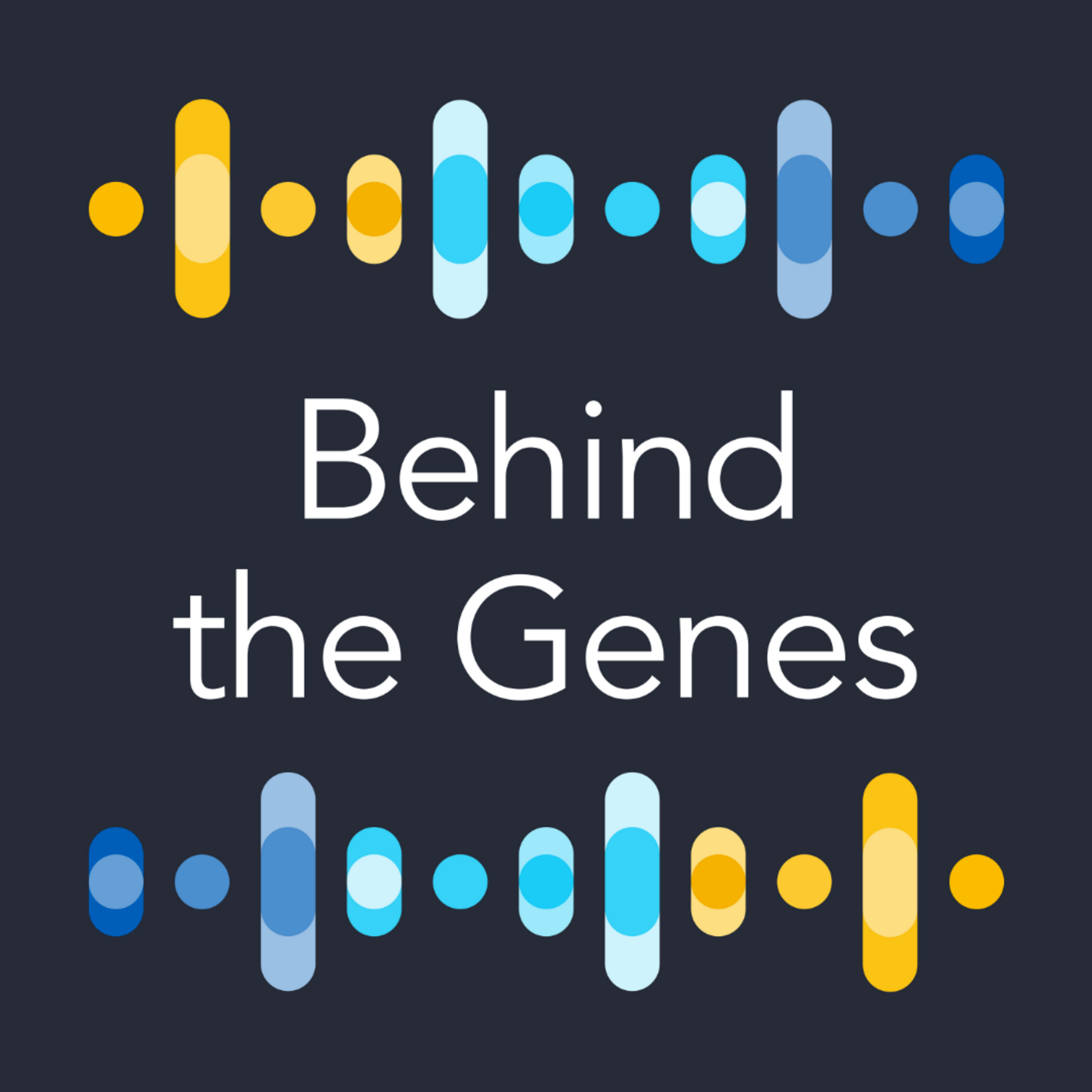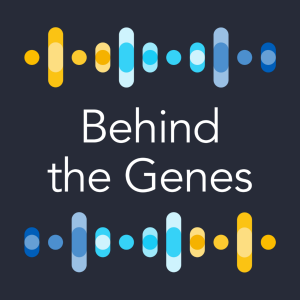
We are Genomics England and our vision is to create a world where everyone benefits from genomic healthcare. Introducing our refreshed podcast identity: Behind the Genes, previously known as The G Word. Join us every fortnight, where we cover everything from the latest in cutting-edge research to real-life stories from those affected by rare conditions and cancer. With thoughtful conversations, we take you behind the science. You can also tune in to our Genomics 101 explainer series which breaks down complex terms in under 10 minutes.
Episodes

Wednesday Apr 03, 2024
Ellen Thomas: Genomics 101 - What is genetic or genomic testing?
Wednesday Apr 03, 2024
Wednesday Apr 03, 2024
In this explainer episode, we’ve asked Ellen Thomas, Interim Chief Medical Officer at Genomics England, to explain what genetic and genomic tests are, why someone might do a test, and how they are performed, in less than 10 minutes.
You can also find a series of short videos explaining some of the common terms you might encounter about genomics on our YouTube channel.
If you’ve got any questions, or have any other topics you’d like us to explain, feel free to contact us on info@genomicsengland.co.uk.
You can download the transcript or read it below.
Naimah: What is genetic or genomic testing? Today, I’m joined by Ellen Thomas, interim chief medical officer for Genomics England, who’s going to explain more. So, first of all Ellen, what is a genetic test?
Ellen: Well, genetic tests examine a person’s genes to see if they have any changes in their DNA which might explain their symptoms. We all have DNA in most of the cells of our bodies, we inherit it from our parents and pass it on to our children. DNA provides the blueprint for our genes, and the proteins which build and run our bodies. Nearly all of our DNA is exactly the same across all of us, but around 5 million out of our 3 billion DNA letters are different, and each of these we call a genetic variant. The pattern of genetic variants that we all carry helps to make us who we are, and genetic testing is designed to examine some of these variants to help inform our healthcare.
Naimah: So, why are they sometimes called genetic tests and sometimes called genomic tests?
Ellen: Well, the words genetic and genomic are often used in exactly the same way, but broadly, genetic tests are usually used to look at just one or a small number of a patient’s genes, while a genomic test will look at hundreds or even thousands of genes at the same time. In general, it’s fine to use either.
Naimah: If you want to hear more about the difference between genetics and genomics, you can find another explainer episode with Rich Scott on our website, which goes into more detail.
Okay, so coming back to you, Ellen, what are the reasons we might do a genomic test?
Ellen: Some rare health conditions are caused by DNA variants in our genes, conditions such as cystic fibrosis, Huntington’s disease or sickle cell disease. In these 3 conditions, there is usually just one gene that is responsible, the same gene for all patients. That means that you can often find the DNA variant which has caused a patient’s symptoms by doing a test which looks just at that gene, or even sometimes just at a part of the gene. But for other genetic conditions, a variant could be found in any of dozens or even hundreds of genes, which could cause the same condition or a group of conditions, and examples of that include familial forms of epilepsy or developmental disorders in children.
For these conditions, to find an answer you often need to do a broader genomic test, looking at many genes at the same time, and also sometimes in between the genes. Finding the variant in a patient’s DNA which has caused the condition is useful, because it helps understand how the condition is passing down in the family, and whether it could affect anyone else in the family in the future. It is also increasingly used to work out which treatment an individual patient might respond to best.
Genomic tests are also used to help diagnose and treat cancer. A tumour develops and spreads because new variants in the DNA build up inside the tumour, which are not present in the patient’s healthy cells. By testing the DNA of the tumour, you can sometimes understand more about why it happened and what treatment might be most effective.
Naimah: So, can you tell me a bit about what sort of questions you can and can’t address with genomic testing, and how has this changed over time?
Ellen: Well, at the most basic level, if a condition is not caused by DNA variants, then a genomic test will not provide any useful information. So, doctors use genomic tests when they suspect that a patient might have an explanation of their symptoms in their genes, but we don’t always find an answer. Sometimes patients with a genomic cause and those with a different cause may have very similar symptoms.
We do constantly learn more about the ways in which genetic variants cause disease through research. Patients may have a gene variant causing their condition, but it’s so rare that it hasn’t yet been discovered, or so complex that it can’t be seen in the test analysis, so the test won’t identify the cause. Sometimes new understanding through research can then find the answer, which can be many years after the patient first developed symptoms.
Naimah: And how are these tests performed? For example, are they a blood sample?
Ellen: Yes, for most rare conditions, the tests use a blood sample. In cancers, a sample of the tumour needs to be tested after it’s removed by surgery or biopsy. The blood or the tumour is then processed to extract the DNA, and then there’s a range of different tests which can be used to read the DNA sequence. Expert scientists in the NHS then review variants in the DNA to make sense of the results and provide information to clinicians and patients about what it means for their diagnosis or treatment.
Naimah: And why are there lots of different genomic tests which can be used in healthcare?
Ellen: There are different types of genetic variants, and there are tests available that are specialised for these different types of genetic variant. Some tests look at a single gene, some tests look at many genes, often known as a panel of genes. Some also compare genomic information from a patient and their parents to understand which DNA variants are likely to be important. The tests will be selected to match what is understood about the patient’s symptoms and their likely cause, and to provide the best chance of finding information which will be useful for their care.
Naimah: That was Ellen Thomas explaining genetic and genomic testing. If you’d like to hear more explainer episodes like this, you can find them on our website at www.genomicsengland.co.uk. Thank you for listening.

No comments yet. Be the first to say something!